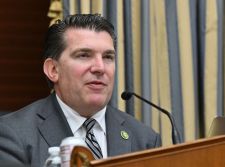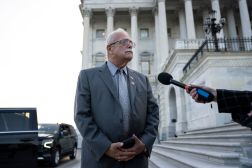Election integrity and ‘digital liberty’ are top of mind for House AI task force member Kat Cammack

As one of the younger members of this Congress, Rep. Kat Cammack grew up in both the analog and digital eras, a fact that has led her to jokingly refer to her office as “effectively House IT,” where other lawmakers who need tech-related help come with tasks such as resetting their iPhones.
The Florida Republican will have a chance to burnish her tech-focused reputation as one of 12 members of her party appointed to the House AI task force. Cammack, who serves on the House Energy and Commerce Subcommittees on Communications and Technology and Innovation, Data and Commerce, said in an interview with FedScoop that the House AI task force will have work to do this election season.
The 2024 cycle “is going to be America’s first real up-close encounter with AI in a bad way,” Cammack said, calling on Congress to first approach AI as a “philosophical product” and engage with private sector leaders. Cammack, a member of the House Rural Broadband and Blockchain Caucuses, added that she “would love to see” the Federal Election Commission put together “top concerns” and work to establish guardrails around AI where it has the authority to do so, with Congress asked to fill in the remaining gaps.
“These administration officials have tremendous latitude in how they can react in real time, and I feel like sometimes you have agencies that overreact and you have some that stand down,” Cammack said. “This is not a situation where we want them to stand down. We want folks to go into the polling booth and feel like they’re very confident that there’s not going to be interference, that they haven’t been lied to and that everything is as it seems.”
Cammack pointed to past elections where voters would receive text messages that a candidate was dropping out of the race. She also acknowledged the ease with which bad actors are able to remove watermarks for AI content, pointed to a proposed solution for AI-generated content that has the potential to confuse voters, and spoke about the rise in the use of deepfake technology.
The FEC has indicated that it is reviewing public comments on the use of AI in campaign ads, and that the agency plans to “resolve the AI rulemaking by early summer,” according to the Washington Post.
Cammack noted her concerns about the federal government coming in with “a heavy hand” on AI matters and stifling “innovation and development.” She’d like to see private sector providers share what they are developing with Congress and what they envision for AI’s future.
“I don’t want us to overregulate because I’m fearful that that will stamp out innovation. I’m fearful that if you don’t address the philosophical issue in these language models, that we’re gonna see real implications immediately and long term,” Cammack said. “AI is not going anywhere; it’s going to be a very big part of every aspect of our lives for the foreseeable future. So we have to make sure that we’re doing everything right on the front end. … For once, we need to actually force the government to look at private sector and say, ‘tell us what you know so we can be better.’”
Cammack said that when someone asks ChatGPT a question, the answer will reflect natural bias and “we want equal opportunity for people to use these systems with the understanding that there’s not going to be an equal outcome, but it’s going to be a truthful one,” adding that language models need “to be a position of digital liberty versus digital authoritarianism.”
“If we don’t approach the philosophical development of the language model, the brain, with a mindset of those basic values and tenants — equal opportunity, freedom, liberty, diversity of thought, expression [and] constitutional protections — then we are going to end up with what we currently have today,” Cammack said. “Which is, a system that will write a poem about Nancy Pelosi but not Donald Trump, where it paints conservatives in a harsh light but a glowing light when it comes to a Democrat.”






